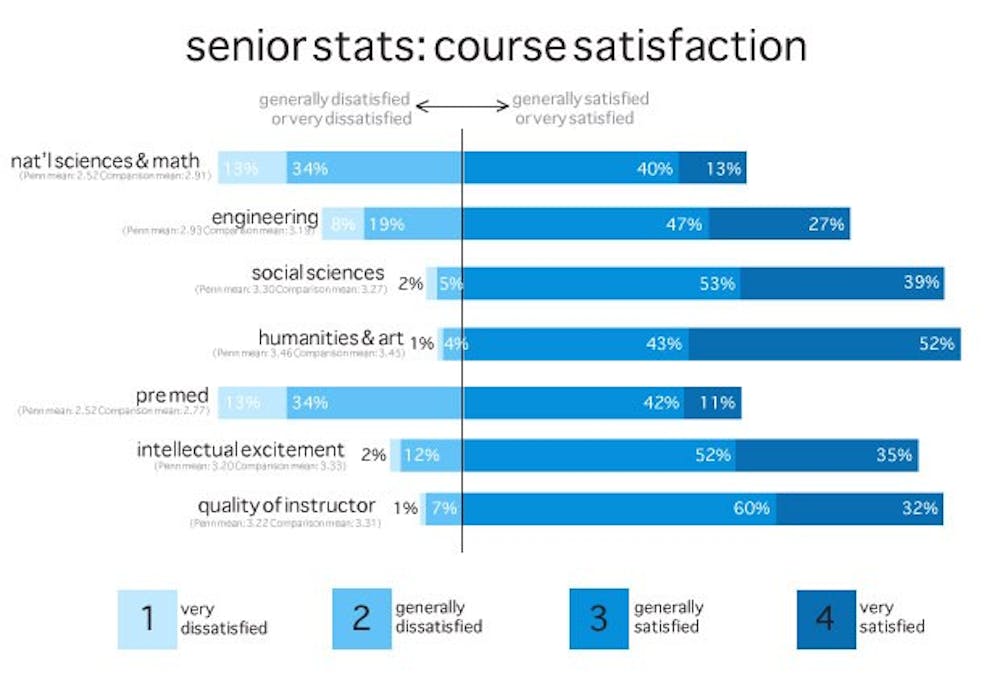
A recently released survey of the 2012 senior class is shedding light on topics ranging from student satisfaction with academics and social life to how much time students spend on schoolwork and at jobs.
Of the 2,407 seniors, 942 — or nearly 40 percent — participated in the survey, which was last distributed in 2010. The report also includes a comparison for most questions to responses received from peer schools, including Brown, Cornell, Yale and Northwestern universities.
Among the results, while 86 percent of students said they were either “generally satisfied” or “very satisfied” with their education at Penn, a significant disparity existed across different types of courses. More than 90 percent of students reported satisfaction with humanities, arts and social science courses, but just over half said they were satisfied with their natural science and math courses. Additionally, only 11 percent said they were “very satisfied” with pre-med courses.
“I’m not surprised by those results,” said College sophomore Elizabeth Joseph, who is pre-med. “There’s that constant pressure to do well and beat the curve, compared to humanities classes where I guess it is a bit more laid-back. I feel like I do get the best learning experiences out of my humanities classes.”
Executive Director for Education and Academic Planning in the Provost’s Office Rob Nelson stressed that he was pleased with the sense of satisfaction with safety and security on campus — 96 percent said they were satisfied with campus security and police — and the higher average satisfaction with recreational facilities than students reported in 2010. He attributed much of the increase to the opening of Penn Park.
“It gave us a huge increase in the amount of green space available to students — both athletic facilities, and also the kinds of green space where you can throw a frisbee around,” Nelson said.
Penn Park also opened opportunities for higher quality structured recreational activities, according to PennRec Director of Recreation Amy Wagner.
“We appreciate hearing that our satisfaction rate has gone up with the student body,” Wagner said in an email. “A lot of it can be attributed to Penn Park — the opening of that facility had a big impact on the quality of our intramural sports leagues, the club programs and our outdoor recreation events and classes.”
Of those who took the survey, 46 percent reported participating in research with a faculty member — seven points lower than the average number reported by the peer comparison group. Nelson partially attributed this to the differences between the four undergraduate schools.
“Wharton students are doing a lot of analysis and research, but may not perceive themselves as doing research the way Engineering and Arts and Sciences students do,” Nelson said. “If I’m a Wharton student, I may be working one-on-one developing a business plan or doing a stock analysis or some kind of financial analysis with a professor, but I’m going to think of myself as learning to be a financial analyst, not doing research.”
More than a third of students said that they had to forgo an unpaid internship or research opportunity to instead work for pay. While Director of Financial Aid Joel Carstens said in an email that this number puts Penn in line with its Ivy peers, Nelson stressed that the University is working on efforts to allow students to pursue these opportunities by providing grants to students to conduct research over the summer or participate in an internship abroad.
Once he reviews the survey with the Council of Undergraduate Deans, Nelson will send the relevant results to a number of departments, including Career Services and the Center for Undergraduate Research and Fellowships. These departments will then be responsible for using the data in their future plans.
“My sense of how the survey is used isn’t to say we dropped two points in a category, therefore we must reallocate our budgets,” Nelson said. “It’s really more a benchmark to see what we know about Penn students and what we’re seeing in the survey. And if something doesn’t line up, it could be a prompt for further investigation.”
The Daily Pennsylvanian is an independent, student-run newspaper. Please consider making a donation to support the coverage that shapes the University. Your generosity ensures a future of strong journalism at Penn.
DonatePlease note All comments are eligible for publication in The Daily Pennsylvanian.





